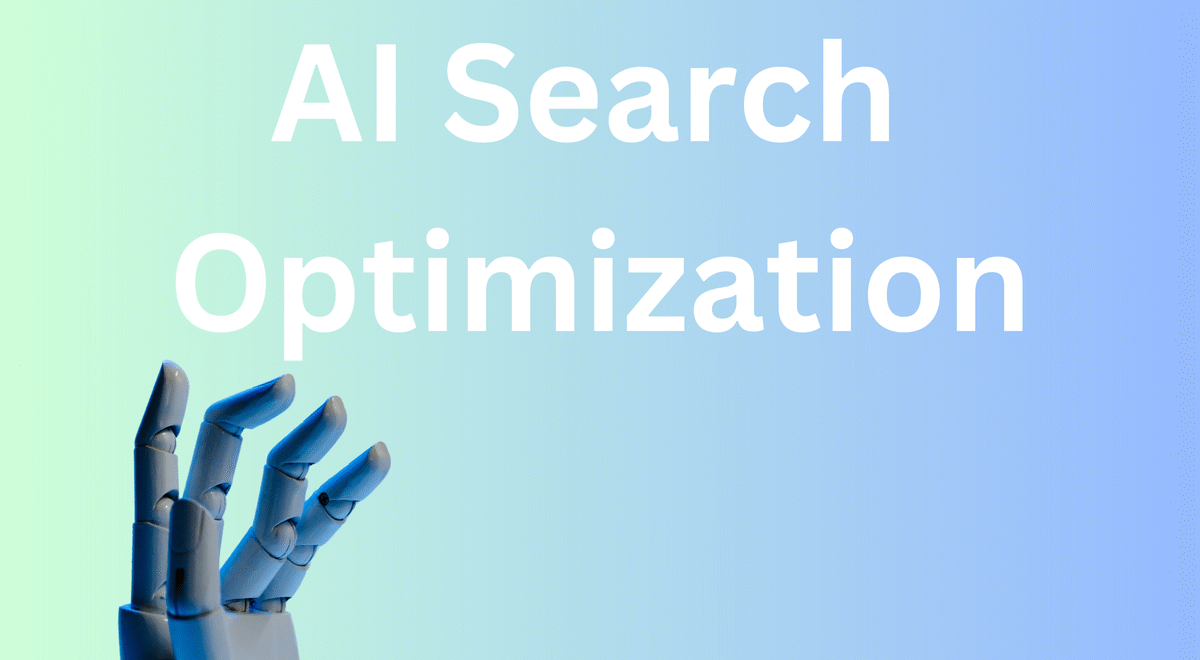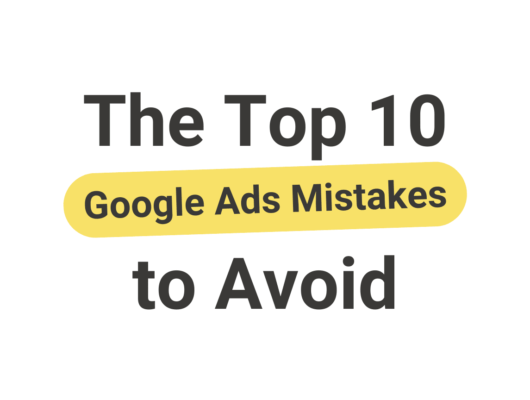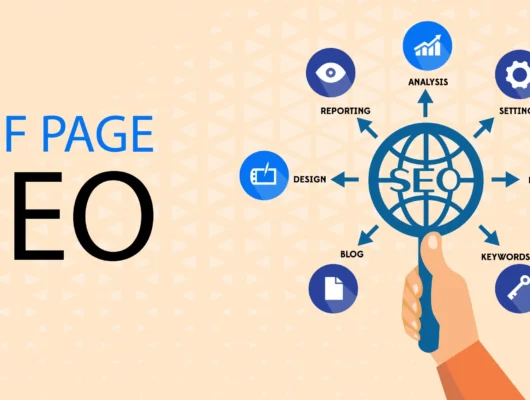Introduction: What is AI Search Optimization?
AI Search Optimization The way we search for information online is evolving at lightning speed. Gone are the days when search engines relied solely on matching exact keywords to deliver results. Artificial intelligence is transforming the way we search online by making the process more intelligent, efficient, and user-friendly than ever before. This transformation is what we call AI Search Optimization.
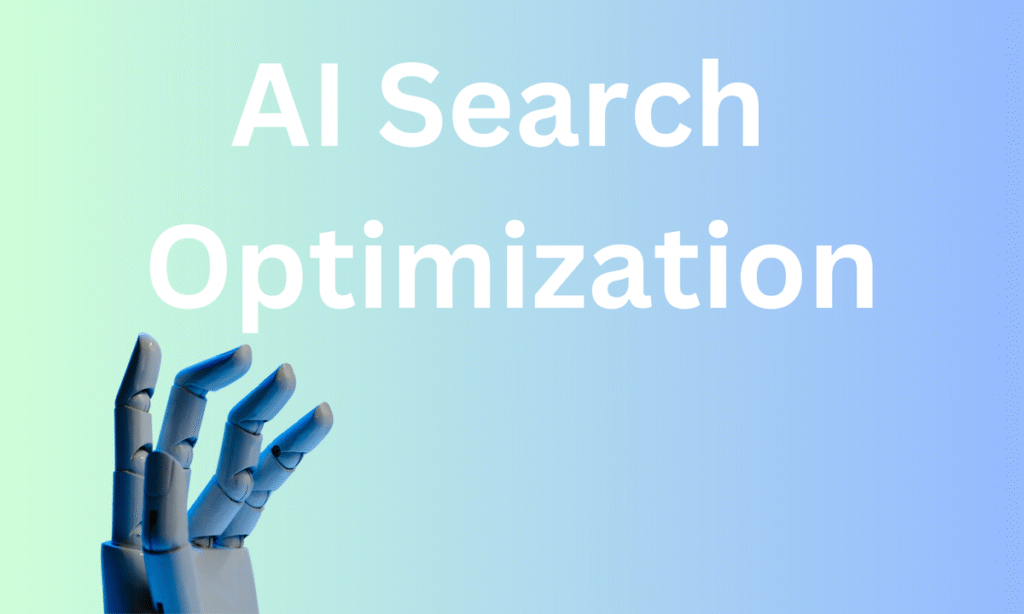
AI search optimization refers to the integration of AI technologies like natural language processing (NLP), machine learning, and deep learning into search engines to enhance how they interpret, rank, and display information. Instead of simply scanning for keywords, AI-powered search engines can now understand user intent, interpret complex queries, analyze content contextually, and even generate helpful answers on the fly.
This transformation significantly impacts businesses, digital marketers, and content creators, requiring them to rethink how they approach online visibility. It means traditional SEO strategies are no longer enough. To stay visible in this AI-driven search landscape, optimization efforts must focus on creating high-quality, context-rich content that aligns with how AI understands and delivers information.
In this article, we’ll explore how AI is reshaping search, the technologies powering this revolution, and how you can optimize your website or content strategy to keep up with the future of search.
1. Evolution of Search: From Keywords to Intelligence
The journey of search engines has seen remarkable progress since their initial development. In the beginning, search relied heavily on exact keyword matching — websites that included specific keywords were ranked higher, regardless of content quality or relevance. This approach led to practices like keyword stuffing and low-quality content simply designed to “game” the system.
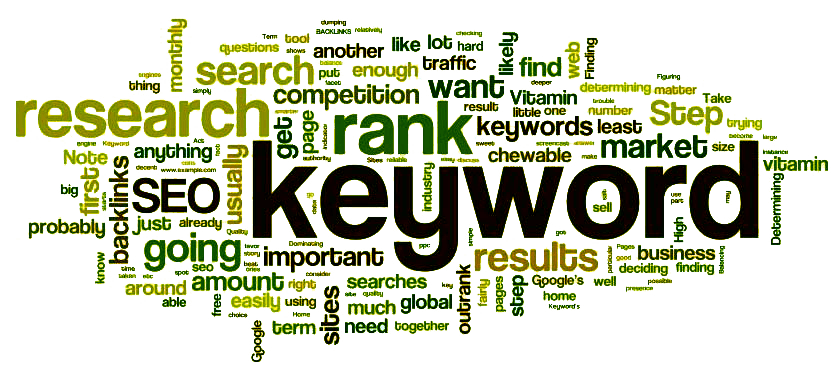
As users began demanding more accurate and relevant results, the need for more intelligent search systems became increasingly clear. Search engines began incorporating semantic search, which focuses not just on the words used but also on the context and intent behind them. Instead of matching strings of text, search engines started to understand what users really mean when they type a query.
A major turning point came with the introduction of Google’s RankBrain, an AI algorithm that uses machine learning to better interpret search queries — especially those that are new or ambiguous. Later advancements like BERT (Bidirectional Encoder Representations from Transformers) and MUM (Multitask Unified Model) further enhanced the ability of search engines to understand language more like humans do — considering tone, nuance, and context.
Today, search is no longer about simply finding web pages with matching words. It’s about delivering accurate, relevant, and personalized results using AI-driven technologies. Whether you’re asking a question, searching with your voice, or uploading an image, modern search engines aim to predict and fulfill your needs with incredible precision.
The shift from basic keyword matching to AI-powered understanding marks a new era in search — one where user intent, context, and content quality are more important than ever before.
2. How AI Improves Search Optimization
Artificial intelligence is not just changing how search engines function — it’s fundamentally enhancing the quality, speed, and accuracy of how we find information online. Traditional search engines relied heavily on static algorithms and keyword matches, but AI introduces dynamic, learning-based systems that constantly improve over time. Here’s how AI elevates the entire search optimization process:
1. Better Understanding of User Intent
AI uses natural language processing (NLP) to interpret the true meaning behind a user’s search query. Instead of relying solely on exact keyword matches, AI evaluates the broader context and the user’s intent to better understand what they’re truly searching for. For instance, it can tell the difference between ‘Apple’, the company, and ‘apple’, the fruit, by analyzing the wording and structure of the query. This leads to search results that are more accurate and aligned with what the user is actually looking for.
2. Personalized Search Results
AI algorithms analyze user behavior, preferences, search history, and location to deliver personalized search experiences. Whether you’re shopping online or researching a topic, AI helps ensure the results are tailored to your unique needs and interests.
3. Improved Content Matching
Through machine learning, AI can assess the quality and relevance of content on a deeper level. It evaluates factors like readability, topical relevance, expertise, and engagement. As a result, content creators are motivated to prioritize meaningful, high-quality content over simply stuffing pages with keywords.
4. Voice and Visual Search Enhancements
With the rise of voice assistants like Alexa and Google Assistant, AI plays a critical role in voice search optimization. It processes natural, conversational language and delivers results that match spoken queries. Similarly, visual search uses AI-powered image recognition to identify objects in photos and suggest relevant content or products.
5. Real-Time Algorithm Adjustments
AI enables search engines to make real-time updates to how they rank and display information. This adaptability ensures that search results stay fresh, current, and aligned with evolving user behavior.
6. Predictive and Auto-Suggest Features
AI powers the autocomplete and “People also ask” features seen in search engines. It predicts what users might be looking for based on patterns from millions of other searches, improving the speed and ease of finding answers.
3. Key AI Technologies Used in Search Optimization
Artificial intelligence is at the heart of modern search optimization, enabling search engines to deliver smarter and more accurate results. Several advanced technologies work together behind the scenes to power this transformation. Let’s take a closer look at the core AI technologies that are driving the next generation of search experiences:
1. Natural Language Processing (NLP)
Natural Language Processing (NLP) enables search engines to interpret human language in a way that feels more intuitive and conversational. NLP interprets sentence structure and intent, not just individual words. Advanced models like Google’s BERT and OpenAI’s GPT have greatly enhanced search engines’ ability to understand complex queries and conversational language.
2. Machine Learning (ML)
By studying user behavior, machine learning helps refine search results to become more precise and relevant with continued use. For example, ML models analyze which results users click on, how long they stay on a page, and whether they return to the search engine afterward. These insights help the system understand what content satisfies user intent and adjust rankings accordingly.
3. Deep Learning
Deep learning, a subset of machine learning, involves using artificial neural networks to analyze large volumes of unstructured data — such as images, videos, or natural language. In search optimization, deep learning improves tasks like image recognition, language understanding, and voice search processing, making search more visual and interactive.
4. Computer Vision
Computer vision enables search engines to understand and analyze images and visual content. This is especially important in visual search, where users upload photos or screenshots to find similar products or information. Platforms like Google Lens and Pinterest Lens rely heavily on computer vision to connect visuals with relevant web content.
5. Reinforcement Learning
Reinforcement learning is a technique where algorithms learn by trial and error, optimizing actions based on feedback. In the context of search, it helps improve ranking algorithms, user interaction models, and ad placement strategies by continuously adapting to what works best in real-time environments.
6. Knowledge Graphs and Semantic Search
AI-powered knowledge graphs link information across the web to deliver richer, more meaningful answers. They enable semantic search, which focuses on understanding the relationships between words, topics, and concepts. This allows search engines to answer questions directly and provide summarized insights instead of just showing links.
4. AI-Powered Tools Changing Search Optimization
The rapid advancement of artificial intelligence has led to the development of powerful tools that are transforming how search engines operate — and how businesses optimize their content to rank better. These AI-driven tools go beyond traditional SEO tactics, offering intelligent insights, automation, and real-time analysis to help marketers stay ahead in the ever-evolving search landscape. These AI tools and platforms are reshaping how search optimization is done today:
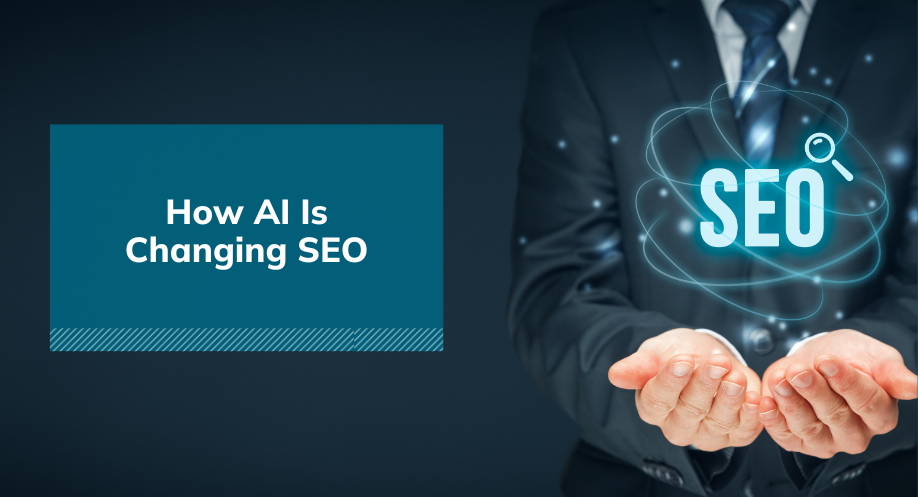
1. Google Search Generative Experience (SGE)
Google’s SGE is one of the most revolutionary updates in recent years. It uses generative AI to deliver more comprehensive and conversational search results. Instead of just showing a list of links, it provides AI-generated overviews, summaries, and direct answers based on the user’s query. This means content creators need to optimize for topics and intent, not just keywords, to be included in these new AI-generated responses.
2. Bing Copilot and Chat-Based Search
Microsoft’s Bing has integrated AI through its Copilot experience, powered by OpenAI. Users can now engage with the search engine through a conversational chat interface, asking follow-up questions or requesting content summaries. Businesses must now adjust their SEO strategies to align with voice-based searches and natural language understanding.
3. You.com and AI-Driven Alternative Search Engines
Platforms like You.com are introducing a new search model that blends traditional results with AI-generated responses and tools. You.com allows users to personalize how they search, and even offers integrated AI writing assistants directly in the search window — signaling the growing influence of customizable, AI-first search engines.
4. SEO Tools with AI Capabilities
A growing number of SEO tools now use AI to assist marketers in improving content performance with greater speed and accuracy:
Surfer SEO utilizes AI to evaluate high-ranking content and offers data-driven recommendations for structuring content, placing keywords, and enhancing overall optimization.
Jasper (formerly Jarvis): An AI writing assistant that helps create SEO-friendly content tailored to user intent and search trends.
Semrush and Ahrefs AI features: These tools are beginning to include predictive analytics and AI-driven keyword research to stay aligned with changing search engine algorithms.
5. AI Content Scoring and Optimization Platforms
Tools like Clearscope, MarketMuse, and Frase.io use AI to evaluate how well your content matches user intent and ranks against competitors. These platforms suggest ways to improve readability, add missing topics, and increase relevance — all based on AI’s understanding of what search engines prioritize.
Why These Tools Matter
AI-powered tools are not just making SEO more efficient — they’re changing the rules entirely. To stay competitive in this new search environment, marketers and content creators must embrace these tools, understand how they function, and use them to align their content with the expectations of AI-driven search engines.
5. Optimizing Your Website for AI-Driven Search
As search engines grow smarter with AI, traditional SEO tactics aren’t enough. Success now depends on understanding how AI processes content, context, and user intent. Here are key strategies to align your site with AI-powered search:
1. Prioritize User Intent Over Keywords
Instead of just matching keywords, focus on content that answers user questions or solves specific problems. Think from the searcher’s perspective.
2. Implement Structured Data (Schema Markup)
Schema markup helps AI better understand your content, enabling rich results like featured snippets and FAQs, which can boost visibility.
3. Optimize for Voice Search
Include natural, conversational phrases and long-tail keywords. This approach helps your content align with voice assistant queries, increasing its likelihood of being featured in voice search results.
4. Enhance Content Quality
AI evaluates content by assessing how clear, unique, and contextually relevant it is to the user’s query. Use clear headings, bullet points, and visuals to improve readability.
5. Strengthen E-E-A-T Signals
Showcase your expertise, link to credible sources, and maintain transparency through author bios, secure HTTPS, and user trust elements.
6. Use AI SEO Tools
Leverage platforms like Surfer SEO or Clearscope to identify gaps and optimize your content based on AI-driven recommendations.
7. Improve Mobile Experience
Ensure your site is fast, responsive, and easy to navigate. A positive user experience influences how AI ranks your content.
8. Keep Content Fresh
Update existing pages regularly to maintain relevance and authority in your niche.
By embracing these strategies, you’ll create content that appeals to both users and AI — increasing visibility, engagement, and search rankings.
6. Challenges and Ethical Concerns
While AI is revolutionizing search optimization, it also brings a range of challenges and ethical concerns that cannot be ignored.
1. Accuracy and Misinformation
AI-generated content and search summaries can sometimes provide incorrect or misleading information. When users rely on AI answers, there’s a risk of spreading false data, especially when sources aren’t clearly cited.
2. Algorithm Bias
AI systems learn from large datasets that may contain bias. This can lead to skewed search results that favor certain viewpoints or exclude diverse perspectives, impacting fairness and representation online.
3. Privacy and Data Use
AI enhances search relevance by analyzing user data, but this practice also brings up concerns about user privacy and data security. Users may not always be aware of how their information is used or stored.
4. Over-Reliance on Automation
As AI handles more aspects of SEO and content creation, there’s a danger of over-dependence. This could lead to generic, machine-generated content that lacks human creativity and emotional connection.
5. Ethical Content Manipulation
With AI tools, it’s easier than ever to manipulate search rankings by producing optimized content at scale. This raises ethical questions around authenticity and whether search results truly reflect quality.
To navigate these challenges, it’s essential to strike a balance between leveraging AI’s power and maintaining human oversight, transparency, and ethical responsibility. Responsible use of AI in search optimization ensures a better, safer digital environment for all.
7. Future of AI Search Optimization
The future of search is being shaped by artificial intelligence at a rapid pace. As AI continues to evolve, search optimization will move far beyond traditional tactics — becoming more personalized, predictive, and conversational. Here’s what lies ahead:

1. Rise of Generative AI in Search
Search engines are already experimenting with AI-generated answers, summaries, and content snippets. Instead of listing ten blue links, the search results of the future will provide direct, AI-crafted responses based on real-time data and context. Content creators will need to structure their content to be included in these AI-driven summaries.
2. Hyper-Personalized Search Experiences
Future search will be deeply personalized, tailored to each user’s preferences, history, and behavior. AI will curate search results that feel custom-built for individual users, making relevance more critical than ever for SEO strategies.
3. Voice and Multimodal Search Expansion
As smart devices and voice assistants gain popularity, the use of voice search is expected to rise steadily. Additionally, multimodal search — combining text, images, and voice — will allow users to search in more natural, intuitive ways. Optimizing for multiple formats will be essential.
4. AI-Powered Search Agents
Soon, intelligent AI agents may handle entire search tasks — not just finding answers, but taking actions like booking, purchasing, or scheduling. Businesses must ensure their digital presence is AI-accessible and action-oriented.
5. Real-Time Search Evolution
AI will make search more dynamic and real-time, constantly adapting to trends, events, and changing user behavior. This means brands must update content regularly and stay ahead of shifting search patterns.
The future of AI search optimization is poised to be smarter, more user-focused, and rapidly evolving. Staying updated and adaptable will be key to staying visible in this evolving digital ecosystem.
Conclusion
AI is fundamentally transforming the way search engines operate—shifting the focus from keyword-stuffed content to intelligent, intent-driven experiences. As artificial intelligence continues to evolve, businesses and marketers must adapt by prioritizing high-quality content, structured data, and a deep understanding of user behavior. Embracing AI-powered tools and strategies not only improves visibility in search results but also ensures long-term success in an ever-changing digital landscape. The future of search lies in relevance, personalization, and smarter engagement—and AI is the key to unlocking it.


